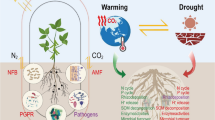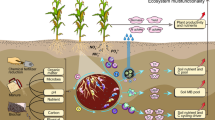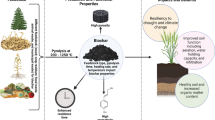Abstract
Plant-soil feedback (PSF) is a fundamental mechanism explaining plant community composition. Two-phase experiments, i.e., conditioning and feedback, represent a common methodology to study PSF. The duration of the conditioning phase varies among studies and the PSF observed is often explained by its biotic component. Little is known about the temporal variation of PSF and its abiotic component. As early life stages are crucial for plant establishment, we grew Rorippa austriaca in soil conditioned over 2, 4, 6 or 8 weeks by a conspecific or a co-occurring species, Agrostis capillaris. For each conditioning duration, we analysed the soil chemical properties and the direction and intensity of intra- or inter-specific feedbacks. With increasing duration, the negative intra- and inter-specific feedbacks became stronger and weaker, respectively. The inter-specific feedback was more negative than the intra-specific feedback at 2 weeks and this reversed thereafter. The Mg content decreased with conditioning duration whatever the conditioning species was. With increasing duration, conditioning by R. austriaca strongly decreased pH, while A. capillaris did not affect pH. The K and P contents were not affected by the conditioning duration and were higher in R. austriaca soil than in A. capillaris soil. Our results suggest that not only conditioning species but also duration of conditioning phase may affect the magnitude of PSF. The changes in soil chemical properties linked to the conditioning species or the conditioning phase duration may drive the feedbacks by affecting plant growth directly or via the interacting microbial communities.


Similar content being viewed by others
References
Bais HP, Weir TL, Perry LG, Gilroy S, Vivanco JM (2006) The role of root exudates in rhizosphere interactions with plants and other organisms. Annu Rev Plant Biol 57:233–266. https://doi.org/10.1146/annurev.arplant.57.032905.105159
Balasooriya WK, Denef K, Huygens D, Boeckx P (2014) Translocation and turnover of rhizodeposit carbon within soil microbial communities of an extensive grassland ecosystem. Plant Soil 376:61–73. https://doi.org/10.1007/s11104-012-1343-z
Bardgett RD, Bowman WD, Kaufmann R, Schmidt SK (2005) A temporal approach to linking aboveground and belowground ecology. Trends Ecol Evol 20:634–641. https://doi.org/10.1016/j.tree.2005.08.005
Baxendale C, Orwin KH, Poly F, Pommier T, Bardgett RD (2014) Are plant–soil feedback responses explained by plant traits? New Phytol 204:408–423. https://doi.org/10.1111/nph.12915
Bever JD (2003) Soil community feedback and the coexistence of competitors: conceptual frameworks and empirical tests. New Phytol 157:465–473. https://doi.org/10.1046/j.1469-8137.2003.00714.x
Bezemer T, Lawson CS, Hedlund K, Edwards AR, Brook AJ, Igual JM, Mortimer SR, van der Putten WH (2006) Plant species and functional group effects on abiotic and microbial soil properties and plant–soil feedback responses in two grasslands. J Ecol 94:893–904. https://doi.org/10.1111/j.1365-2745.2006.01158.x
Bleeker W (2003) Hybridization and Rorippa austriaca (Brassicaceae) invasion in Germany. Mol Ecol 12:1831–1841. https://doi.org/10.1046/j.1365-294X.2003.01854.x
Bleeker W, Matthies A (2005) Hybrid zones between invasive Rorippa austriaca and native R. sylvestris (Brassicaceae) in Germany: ploidy levels and patterns of fitness in the field. Heredity 94:664–670. https://doi.org/10.1038/sj.hdy.6800687
Bolou-Bi EB, Poszwa A, Leyval C, Vigier N (2010) Experimental determination of magnesium isotope fractionation during higher plant growth. Geochim Cosmochim Acta 74:2523–2537. https://doi.org/10.1016/j.gca.2010.02.010
Brinkman EP, van der Putten WH, Bakker EJ, Verhoeven KJ (2010) Plant–soil feedback: experimental approaches, statistical analyses and ecological interpretations. J Ecol 98:1063–1073. https://doi.org/10.1111/j.1365-2745.2010.01695.x
Bukowski AR, Petermann JS (2014) Intraspecific plant–soil feedback and intraspecific overyielding in Arabidopsis thaliana. Ecol Evol 4:2533–2545. https://doi.org/10.1002/ece3.1077
Cabin RJ, Mitchell RJ (2000) To Bonferroni or not to Bonferroni: when and how are the questions. Bull Ecol Soc Am 81:246–248
Cahill JF, Cale JA, Karst J, Bao T, Pec GJ, Erbilgin N (2017) No silver bullet: different soil handling techniques are useful for different research questions, exhibit differential type I and II error rates, and are sensitive to sampling intensity. New Phytol 216:11–14. https://doi.org/10.1111/nph.14141
Cipollini D, Cipollini K (2016) A review of garlic mustard (Alliaria petiolata, Brassicaceae) as an allelopathic plant. J Torrey Bot Soc 143:339–348. https://doi.org/10.3159/TORREY-D-15-00059
Cortois R, Schröder-Georgi T, Weigelt A, van der Putten WH, De Deyn GB (2016) Plant–soil feedbacks: role of plant functional group and plant traits. J Ecol 104:1608–1617. https://doi.org/10.1111/1365-2745.12643
Craine JM, Dybzinski R (2013) Mechanisms of plant competition for nutrients, water and light. Funct Ecol 27:833–840. https://doi.org/10.1111/1365-2435.12081
Dietz H, Köhler A, Ullmann I (2002) Regeneration growth of the invasive clonal forb Rorippa austriaca (Brassicaceae) in relation to fertilization and interspecific competition. Plant Ecol 158:171–182. https://doi.org/10.1023/A:1015567316004
Diez JM, Dickie I, Edwards G, Hulme PE, Sullivan JJ, Duncan RP (2010) Negative soil feedbacks accumulate over time for non-native plant species. Ecol Lett 13:803–809. https://doi.org/10.1111/j.1461-0248.2010.01474.x
Dostál P, Müllerová J, Pyšek P, Pergl J, Klinerová T (2013) The impact of an invasive plant changes over time. Ecol Lett 16:1277–1284. https://doi.org/10.1111/ele.12166
Dostálek T, Pánková H, Münzbergová Z, Rydlová J (2013) The effect of AMF suppression on plant species composition in a nutrient-poor dry grassland. PLoS One 8:e80535. https://doi.org/10.1371/journal.pone.0080535
Dostálek T, Münzbergová Z, Kladivová A, Macel M (2016) Plant–soil feedback in native vs. invasive populations of a range expanding plant. Plant Soil 399:209–220. https://doi.org/10.1007/s11104-015-2688-x
Ehlers BK (2011) Soil microorganisms alleviate the allelochemical effects of a thyme monoterpene on the performance of an associated grass species. PLoS One 6:e26321. https://doi.org/10.1371/journal.pone.0026321
Ehrenfeld JG (2003) Effects of exotic plant invasions on soil nutrient cycling processes. Ecosystems 6:503–523. https://doi.org/10.1007/s10021-002-0151-3
Ehrenfeld JG, Kourtev P, Huang W (2001) Changes in soil functions following invasions of exotic understory plants in deciduous forests. Ecol Appl 11:1287–1300. doi:10.1890/1051-0761(2001)011[1287:CISFFI]2.0.CO;2
Ehrenfeld JG, Ravit B, Elgersma K (2005) Feedback in the plant-soil system. Annu Rev Environ Resour 30:75–115. https://doi.org/10.1146/annurev.energy.30.050504.144212
Fierer N, Jackson RB (2006) The diversity and biogeography of soil bacterial communities. Proc Natl Acad Sci USA 103:626–631. https://doi.org/10.1073/pnas.0507535103
Fry EL, Pilgrim ES, Tallowin JR, Smith RS, Mortimer SR, Beaumont DA, Simkin J, Harris SJ, Shiel RS, Quirk H, Harrison KA, Lawson CS, Hobbs PJ, Bardgett RD (2017) Plant, soil and microbial controls on grassland diversity restoration: a long-term, multi-site mesocosm experiment. J Appl Ecol 54:1320–1330. https://doi.org/10.1111/1365-2664.12869
Gómez-Aparicio L, Canham CD (2008) Neighborhood models of the effects of invasive tree species on ecosystem processes. Ecol Monogr 78:69–86. https://doi.org/10.1890/06-2036.1
Haney CH, Samuel BS, Bush J, Ausubel FM (2015) Associations with rhizosphere bacteria can confer an adaptive advantage to plants. Nat Plants 1. https://doi.org/10.1038/nplants.2015.51
Hawkes CV, Belnap J, D’Antonio C, Firestone MK (2006) Arbuscular mycorrhizal assemblages in native plant roots change in the presence of invasive exotic grasses. Plant Soil 281:369–380. https://doi.org/10.1007/s11104-005-4826-3
Hawkes CV, Kivlin SN, Du J, Eviner VT (2013) The temporal development and additivity of plant-soil feedback in perennial grasses. Plant Soil 369:141–150. https://doi.org/10.1007/s11104-012-1557-0
Hemrová L, Knappová J, Münzbergová Z (2016) Assessment of habitat suitability is affected by plant-soil feedback: comparison of field and garden experiment. PLoS One 11:e0157800. https://doi.org/10.1371/journal.pone.0157800
Hendriks M, Mommer L, Caluwe H, Smit-Tiekstra AE, van der Putten WH, Kroon H (2013) Independent variations of plant and soil mixtures reveal soil feedback effects on plant community overyielding. J Ecol 101:287–297. https://doi.org/10.1111/1365-2745.12032
Hendriks M, Ravenek JM, Smit-Tiekstra AE, Paauw JW, Caluwe H, van der Putten WH, de Kroon H, Mommer L (2015) Spatial heterogeneity of plant–soil feedback affects root interactions and interspecific competition. New Phytol 207:830–840. https://doi.org/10.1111/nph.13394
Houlden A, Timms-Wilson TM, Day MJ, Bailey MJ (2008) Influence of plant developmental stage on microbial community structure and activity in the rhizosphere of three field crops. FEMS Microbiol Ecol 65:193–201. https://doi.org/10.1111/j.1574-6941.2008.00535.x
Hovatter S, Blackwood CB, Case AL (2013) Conspecific plant–soil feedback scales with population size in Lobelia siphilitica (Lobeliaceae). Oecologia 173:1295–1307. https://doi.org/10.1007/s00442-013-2710-z
Inderjit S (2005) Soil microorganisms: an important determinant of allelopathic activity. Plant Soil 274:227–236. https://doi.org/10.1007/s11104-004-0159-x
Javaid A (2008) Allelopathy in mycorrhizal symbiosis in the Poaceae family. Allelopath J 21:207–218
Jones C, Jacobsen J (2005) Plant nutrition and soil fertility. Nutr Manag Module 2:1–11
Jonsell B (1973) Taxonomy and distribution of Rorippa (Cruciferae) in the southern USSR. Sven Bot Tidskr 67:281–302
Kardol P, Bezemer TM, van der Putten WH (2006) Temporal variation in plant–soil feedback controls succession. Ecol Lett 9:1080–1088. https://doi.org/10.1111/j.1461-0248.2006.00953.x
Kardol P, Cornips NJ, van Kempen MM, Bakx-Schotman JM, van der Putten WH (2007) Microbe-mediated plant–soil feedback causes historical contingency effects in plant community assembly. Ecol Monogr 77:147–162. https://doi.org/10.1890/06-0502
Kardol P, Deyn GB, Laliberte E, Mariotte P, Hawkes CV (2013) Biotic plant–soil feedbacks across temporal scales. J Ecol 101:309–315. https://doi.org/10.1111/1365-2745.12046
Klironomos JN (2002) Feedback with soil biota contributes to plant rarity and invasiveness in communities. Nature 417:67–70. https://doi.org/10.1038/417067a
Kourtev PS, Ehrenfeld JG, Häggblom M (2003) Experimental analysis of the effect of exotic and native plant species on the structure and function of soil microbial communities. Soil Biol Biochem 35:895–905. https://doi.org/10.1016/S0038-0717(03)00120-2
Kruse M, Strandberg M, Strandberg B (2000) Ecological effects of allelopathic plants-a review. NERI Technical Report 315
Kuebbing SE, Classen AT, Call JJ, Henning JA, Simberloff D (2015) Plant–soil interactions promote co-occurrence of three nonnative woody shrubs. Ecology 96:2289–2299. https://doi.org/10.1890/14-2006.1
Kulmatiski A, Kardol P (2008) Getting plant-soil feedbacks out of the greenhouse: experimental and conceptual approaches. Prog Bot 69:449–472. https://doi.org/10.1007/978-3-540-72954-9_18
Kulmatiski A, Beard KH, Stevens JR, Cobbold SM (2008) Plant–soil feedbacks: a meta-analytical review. Ecol Lett 11:980–992. https://doi.org/10.1111/j.1461-0248.2008.01209.x
Kuzyakov Y, Domanski G (2000) Carbon input by plants into the soil. Review. J Plant Nutr Soil Sci 163:421–431. https://doi.org/10.1002/1522-2624(200008)163:4<421:AID-JPLN421>3.0.CO;2-R
Lankau R (2010) Soil microbial communities alter allelopathic competition between Alliaria petiolata and a native species. Biol Invasions 12:2059–2068. https://doi.org/10.1007/s10530-009-9608-z
Lankau RA (2013) Species invasion alters local adaptation to soil communities in a native plant. Ecology 94:32–40. https://doi.org/10.1890/12-0675.1
Lauber CL, Strickland MS, Bradford MA, Fierer N (2008) The influence of soil properties on the structure of bacterial and fungal communities across land-use types. Soil Biol Biochem 40:2407–2415. https://doi.org/10.1016/j.soilbio.2008.05.021
LeBauer DS, Treseder KK (2008) Nitrogen limitation of net primary productivity in terrestrial ecosystems is globally distributed. Ecology 89:371–379. https://doi.org/10.1890/06-2057.1
Macel M, Dostálek T, Esch S, Bucharová A, van Dam NM, Tielbörger K, Verhoeven KJF, Münzbergová Z (2017) Evolutionary responses to climate change in a range expanding plant. Oecologia 184:543–554. https://doi.org/10.1007/s00442-017-3864-x
Mangla S, Inderjit Callaway RM (2008) Exotic invasive plant accumulates native soil pathogens which inhibit native plants. J Ecol 96:58–67. https://doi.org/10.1111/j.1365-2745.2007.01312.x
Meisner A, De Boer W, Cornelissen JH, van der Putten WH (2012) Reciprocal effects of litter from exotic and congeneric native plant species via soil nutrients. PLoS One 7:e31596. https://doi.org/10.1371/journal.pone.0031596
Micallef SA, Channer S, Shiaris MP, Colón-Carmona A (2009) Plant age and genotype impact the progression of bacterial community succession in the Arabidopsis rhizosphere. Plant Signal Behav 4:777–780. https://doi.org/10.4161/psb.4.8.9229
Mougel C, Offre P, Ranjard L, Corberand T, Gamalero E, Robin C, Lemanceau P (2006) Dynamic of the genetic structure of bacterial and fungal communities at different developmental stages of Medicago truncatula Gaertn. cv. Jemalong line J5. New Phytol 170:165–175. https://doi.org/10.1111/j.1469-8137.2006.01650.x
Müller C (2009) Role of glucosinolates in plant invasiveness. Phytochem Rev 8:227–242. https://doi.org/10.1007/s11101-008-9116-2
Münzbergová Z, Šurinová M (2015) The importance of species phylogenetic relationships and species traits for the intensity of plant-soil feedback. Ecosphere 6:1–16. https://doi.org/10.1890/ES15-00206.1
Newbery RM, Wolfenden J, Mansfield TA, Harrison AF (1995) Nitrogen, phosphorus and potassium uptake and demand in Agrostis capillaris: the influence of elevated CO2 and nutrient supply. New Phytol 130:565–574. https://doi.org/10.1111/j.1469-8137.1995.tb04333.x
Oberdorfer E (1990) Pflanzensoziologische Exkursionsflora. Ulmer, Stuttgart
Pánková H, Münzbergová Z, Rydlová J, Vosátka M (2008) Differences in AM fungal root colonization between populations of perennial Aster species have genetic reasons. Oecologia 157:211–220. https://doi.org/10.1007/s00442-008-1064-4
Pánková H, Münzbergová Z, Rydlová J, Vosátka M (2014) Co-adaptation of plants and communities of arbuscular mycorrhizal fungi to their soil conditions. Folia Geobot 49:521–540. https://doi.org/10.1007/s12224-013-9183-z
Petermann JS, Fergus AJF, Turnbull LA, Schmid B (2008) Janzen-Connell effects are widespread and strong enough to maintain diversity in grasslands. Ecology 89:2399–2406. https://doi.org/10.1890/07-2056.1
Philippot L, Raaijmakers JM, Lemanceau P, van der Putten WH (2013) Going back to the roots: the microbial ecology of the rhizosphere. Nat Rev Microbiol 11:789–799. https://doi.org/10.1038/nrmicro3109
Pieterse CM, de Jonge R, Berendsen RL (2016) The soil-borne supremacy. Trends Plant Sci 21:171–173. https://doi.org/10.1016/j.tplants.2016.01.018
Pregitzer CC, Bailey JK, Schweitzer JA (2013) Genetic by environment interactions affect plant–soil linkages. Ecol Evol 3:2322–2333. https://doi.org/10.1002/ece3.618
Raabová J, Fischer M, Münzbergová Z (2008) Niche differentiation between diploid and hexaploid Aster amellus. Oecologia 158:463–472. https://doi.org/10.1007/s00442-008-1156-1
Rajasekar S, Fei SZ, Christians NE (2007) Analysis of genetic diversity in colonial bentgrass (Agrostis capillaris L.) using randomly amplified polymorphic DNA (RAPD) markers. Genet Resour Crop Evol 54:45–53. https://doi.org/10.1007/s10722-005-1883-7
Ramette A (2007) Multivariate analyses in microbial ecology. FEMS Microbiol Ecol 62:142–160. https://doi.org/10.1111/j.1574-6941.2007.00375.x
Ranjard L, Richaume A (2001) Quantitative and qualitative microscale distribution of bacteria in soil. Res Microbiol 152:707–716. https://doi.org/10.1016/S0923-2508(01)01251-7
Regvar M, Vogel K, Irgel N, Wraber T, Hildebrandt U, Wilde P, Bothe H (2003) Colonization of pennycresses (Thlaspi spp.) of the Brassicaceae by arbuscular mycorrhizal fungi. J Plant Physiol 160:615–626. https://doi.org/10.1078/0176-1617-00988
Reinhart KO, Rinella MJ (2016) A common soil handling technique can generate incorrect estimates of soil biota effects on plants. New Phytol 210:786–789. https://doi.org/10.1111/nph.13822
Reinhart KO, Royo AA, van der Putten WH, Clay K (2005) Soil feedback and pathogen activity in Prunus serotina throughout its native range. J Ecol 93:890–898. https://doi.org/10.1111/j.1365-2745.2005.01028.x
Rengel Z, Marschner P (2005) Nutrient availability and management in the rhizosphere: exploiting genotypic differences. New Phytol 168:305–312. https://doi.org/10.1111/j.1469-8137.2005.01558.x
Reynolds HL, Packer A, Bever JD, Clay K (2003) Grassroots ecology: plant–microbe–soil interactions as drivers of plant community structure and dynamics. Ecology 84:2281–2291. https://doi.org/10.1890/02-0298
Rooney DC, Kennedy NM, Gleeson DB, Clipson NJ (2013) Bacterial communities’ response to nitrogen, lime, and plants. In: Rooney DC (ed) Sustainable soil management. Apple Academic Press, Oakville, pp 159–172
Rousk J, Bååth E, Brookes PC, Lauber CL, Lozupone C, Caporaso JG, Knight R, Fierer N (2010a) Soil bacterial and fungal communities across a pH gradient in an arable soil. ISME J 4:1340–1351. https://doi.org/10.1038/ismej.2010.58
Rousk J, Brookes PC, Bååth E (2010b) Investigating the mechanisms for the opposing pH relationships of fungal and bacterial growth in soil. Soil Biol Biochem 42:926–934. https://doi.org/10.1016/j.soilbio.2010.02.009
Ruemmele BA (2003) Colonail bentgrass. In: Casler MD, Duncan RR (eds) Turfgrass biology, genetics, and breeding. Wiley, New York, pp 187–200
Schenk HJ (2006) Root competition: beyond resource depletion. J Ecol 94:725–739. https://doi.org/10.1111/j.1365-2745.2006.01124.x
Schweitzer JA, Bailey JK, Fischer DG, LeRoy CJ, Lonsdorf EV, Whitham TG, Hart SC (2008) Plant–soil–microorganism interactions: heritable relationship between plant genotype and associated soil microorganisms. Ecology 89:773–781. https://doi.org/10.1890/07-0337.1
Schwinning S, Weiner J (1998) Mechanisms determining the degree of size asymmetry in competition among plants. Oecologia 113:447–455. https://doi.org/10.1007/s004420050397
Speek TA, Schaminée JH, Stam JM, Lotz LA, Ozinga WA, van der Putten WH (2015) Local dominance of exotic plants declines with residence time: a role for plant soil feedback? AoB Plants 7:plv021. https://doi.org/10.1093/aobpla/plv021
Stinson KA, Campbell SA, Powell JR, Wolfe BE, Callaway RM, Thelen GC, Hallett SG, Prati D, Klironomos JN (2006) Invasive plant suppresses the growth of native tree seedlings by disrupting belowground mutualisms. PLoS Biol 4:e140. https://doi.org/10.1371/journal.pbio.0040140
Sudová R, Doubková P, Vosátka M (2008) Mycorrhizal association of Agrostis capillaris and Glomus intraradices under heavy metal stress: combination of plant clones and fungal isolates from contaminated and uncontaminated substrates. Appl Soil Ecol 40:19–29. https://doi.org/10.1016/j.apsoil.2008.02.007
Tamis WLM, Van’t Zelfde M, van der Meijden R, Udo de Haes HA (2005) Changes in vascular plant biodiversity in the Netherlands in the 20th century explained by their climatic and other environmental characteristics. Clim Change 72:37–56. https://doi.org/10.1007/s10584-005-5287-7
Teste FP, Kardol P, Turner BL, Wardle DA, Zemunik G, Renton M, Laliberté E (2017) Plant-soil feedback and the maintenance of diversity in Mediterranean-climate shrublands. Science 355:173–176. https://doi.org/10.1126/science.aai8291
Trinder CJ, Brooker RW, Robinson D (2013) Plant ecology’s guilty little secret: understanding the dynamics of plant competition. Funct Ecol 27:918–929. https://doi.org/10.1111/1365-2435.12078
van Breemen N (1995) How Sphagnum bogs down other plants. Trends Ecol Evol 10:270–275. https://doi.org/10.1016/0169-5347(95)90007-1
van der Heijden MG (2004) Arbuscular mycorrhizal fungi as support systems for seedling establishment in grassland. Ecol Lett 7:293–303. https://doi.org/10.1111/j.1461-0248.2004.00577.x
van der Putten WH, Bardgett RD, Bever JD, Bezemer TM, Casper BB, Fukami T, Kardol P, Klironomos JN, Kulmatiski A, Schweitzer JA, Suding KN, Van de Voorde TFJ, Wardle DA (2013) Plant–soil feedbacks: the past, the present and future challenges. J Ecol 101:265–276. https://doi.org/10.1111/1365-2745.12054
van Grunsven RH, van der Putten WH, Bezemer T, Tamis WL, Berendse F, Veenendaal EM (2007) Reduced plant–soil feedback of plant species expanding their range as compared to natives. J Ecol 95:1050–1057. https://doi.org/10.1111/j.1365-2745.2007.01282.x
Verbruggen N, Hermans C (2013) Physiological and molecular responses to magnesium nutritional imbalance in plants. Plant Soil 368:87–99. https://doi.org/10.1007/s11104-013-1589-0
Acknowledgements
The study was supported by the Czech Science Foundation (project GAČR 16-09659S). It was also partly supported by RVO 67985939 and the Czech Ministry of Education, Youth and Sports (MŠMT). We thank the participants of PopEcol discussion group and two anonymous reviewers for their helpful comments on previous versions of the manuscript.
Author information
Authors and Affiliations
Contributions
ZV, TD and ZM conceived and designed the experiments. ZV performed the experiments. CL, ZV, TD and ZM analysed the data. CL, TD and ZM wrote the manuscript. All authors provided advice and comments on the manuscript.
Corresponding author
Additional information
Communicated by Edith B. Allen.
Electronic supplementary material
Below is the link to the electronic supplementary material.
Rights and permissions
About this article
Cite this article
Lepinay, C., Vondráková, Z., Dostálek, T. et al. Duration of the conditioning phase affects the results of plant-soil feedback experiments via soil chemical properties. Oecologia 186, 459–470 (2018). https://doi.org/10.1007/s00442-017-4033-y
Received:
Accepted:
Published:
Issue Date:
DOI: https://doi.org/10.1007/s00442-017-4033-y




